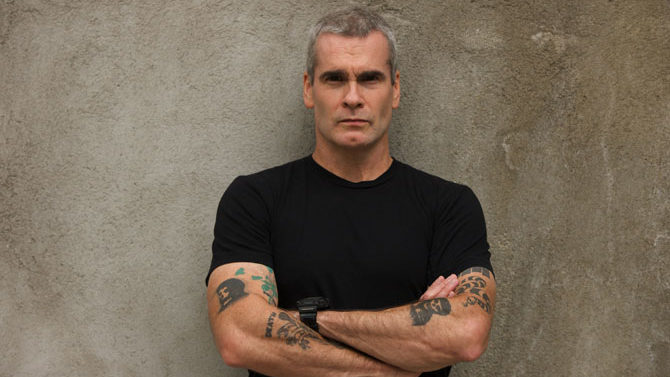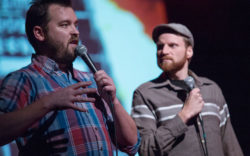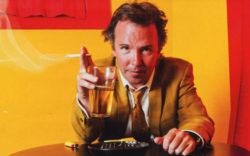How to describe a man like Henry Rollins? His résumé must span no less than 15 cubits of papyrus, and throughout his three-decade-long career, the self-described “aging alternative icon†has never shown any indications of slowing down. Rollins joined Black Flag in 1981, and two years later, he did his first “talking show.â€
“There was a promoter in L.A. who would do these interesting shows,†says Rollins, “where he would put 20 people on a bill, and everyone did five or seven minutes [of spoken word] each.â€
One fateful night, the promoter suggested that Rollins give it a go. The young punk rocker was apprehensive, claiming that he didn’t “really have anything to say.†However, when the promoter informed Rollins that each performer would receive a hefty pay-out of $10, he responded, “Oh, well, then I’ve got something to say. I say I need 10 bucks.â€
So, he marched onstage one night and decided to share a few stories from Black Flag practice. “Some white-power enthusiasts tried to run over our guitar player because we were having non-white people come to band practice,” says Rollins. “They apparently had a problem with that. It’s a hell of a thing to hear from someone. So, people said, ‘Tell more stories.’”
That storied night began Rollins’ lifelong struggle with multifaceted workaholism. In 1985 Rollins did a cross-country spoken-word tour, visiting Athens along the way. For an outsider, he’s surprisingly familiar with the Athenian turf—he gave eerily specific directions to the presumably now-defunct venue he played some 27 years back, referencing “that record store on the corner, the famous one where R.E.M. used to hang out 800 years ago.â€
From 1983 on, Rollins apparently resolved to never take a break. Ever.
“By ’86,†he says, “I was doing shows in Europe. By ’87, I was doing quite a bit of them. I would just go on tour on my own as soon as the band tour would end, turn right around and go back out again on my own, doing these kind of double-laps around the world.â€
Since the Black Flag era, Rollins has successfully pursued countless artistic endeavors. A Grammy win for his 1994 audio book Get in the Van, over two dozen spoken-word albums/videos, seven Rollins Band studio albums, several acting credits… the list goes on. All this success and acclaim has produced what appears to be an extraordinarily confident performer. However, there is one thing that makes the artist a little anxious.
“Any title scares me,†says Rollins, “because I just don’t think I really have it. I’ve written, like, 27 books… but someone says, ‘You’re a prolific writer,’ and I say, ‘I’m just someone who puts a lot of books out.’ And someone says, ‘You’re a comedian,’ and I go, ‘Oh, no, no, no, no—now I’m on the hook to make you laugh all the time.’ It’s an art and a discipline I greatly admire—I just don’t think that I’ve got it. So, I’ve always called these ‘talking shows’—at least that much is true. I get up there and talk. I can’t guarantee that it’s going to be funny. You know, a visit to Walter Reed, looking at blown-up young men—there’s really no humor there… so I’ve always tried to steer away from anything that would paint me into a corner. Not in any effort to say, ‘Oh, I’m so unique,’—not at all. It’s me not wanting to make some guy mad at some club in New Jersey where he wants to give me a beating because I didn’t do any dick jokes.â€
Rollins feels privileged to have the means to constantly travel the world; his expeditions not only give him fascinating stories to tell onstage, but also a constantly evolving perspective. When he recounts his experiences, Rollins’ main goal is clarity—to deliver his stories, observations and opinions “ambiguity-free.â€
“That’s my aim,†he says. “For you and I to be on the same page. Even if you disagree with everything I said—which is fine—at least we’re clear. Early on, the aim was not as articulated as it is now. Now, I go all over the world looking for topics, looking for stories, putting myself in pretty interesting environments, like all over Africa, Southeast Asia, the Middle East, [etc.].â€
Rollins makes a point to create substantive, captivating material, expressing a deep sense of obligation and respect toward his audience.
“I would never presume to think that I’m making an audience think,†he says. “I want the audience to know that I’m doing my homework—that I’m coming with something that’s not just some sideways ramble. I go for real precision, and, basically, once the first couple sentences have come out of my mouth, we are strapped in and down the highway… If I can’t add something to the conversational stew-pot, I try and stay away from the topic. When I’m onstage, the thing that may never happen—the big no-no—would be me wasting your time.â€
Like what you just read? Support Flagpole by making a donation today. Every dollar you give helps fund our ongoing mission to provide Athens with quality, independent journalism.










